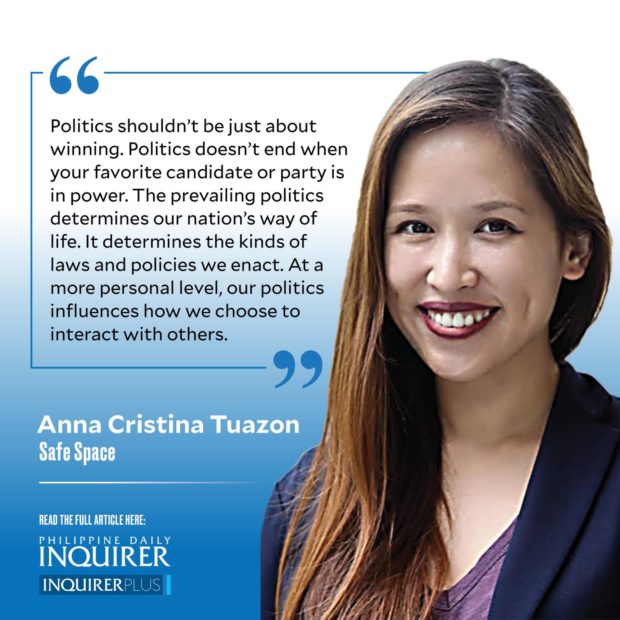How to talk to each other about politics

As elections draw near, more and more people are engaging in political posts and discussions. Talking politics can seem adversarial—pro vs. anti; your candidate vs. mine. We openly spar with strangers on the internet who are supporters of the “other side” and, perhaps, even relish when we feel that we’ve put them down or that we got the last word in the argument. Our family and friend chat groups have also become battlefields, with some instituting rules banning political talk due to hurt feelings arising from such discussions. Is it possible to talk politics without hurting each other? Or do we sometimes consider other people’s feelings too much that we allow for the silencing of valuable discussions, topics, and perspectives?
I invite us to consider a different approach when talking politics. And this starts with what we want to get out of it. If our goal is to “win,” then we naturally think of others as our opponents. If so, our tools of choice are blame and shame. We think the world will be better only if THEY change. We are willing to put them down and make them feel bad in the service of being right. However, politics shouldn’t be just about winning. Politics doesn’t end when your favorite candidate or party is in power. The prevailing politics determines our nation’s way of life. It determines the kinds of laws and policies we enact. At a more personal level, our politics influences how we choose to interact with others. In a way, your politics affects my politics and vice versa. This makes the problems of politics a shared problem that needs to be solved together. In family therapy, most families come into the session by highlighting the conflicts between members, usually blaming each other. Therapists attempt to dismantle this “you vs. me” mentality and help families realize that their members aren’t the problem—the problem is the problem. Once families realize that they have a shared problem, they’ll start seeing each other as a team. This creates a significant shift and allows solutions to happen. It is the same when discussing politics—we need to approach it as a shared problem (what does our country need), so we can come up with the best solution (who to vote for). This requires the willingness to hear the needs of all and the openness to consider solutions that didn’t come from us.
A lot of people ask me how to be effective with other people when talking politics and my answer is always “Listen first.” How best to be understood by other people? You must understand them. How to get them to change their minds? Be open to the possibility of changing yours. It sounds counterintuitive, but it works. Before you try to convince others to vote for your favorite candidate, essentially telling them that your candidate is the solution, you first need to listen and understand their view of the political problem.
The issue of arguments being so focused on the candidates is that instead of talking about what’s best for the country, it ends up being a contest for your favorite personality or a test of regional or family loyalty. To get away from that, I strongly suggest we start sharing with each other our vision. What kind of country or community would we like to live in? What kind of world would we like to leave for our children? In family therapy, I ask parents to envision what kind of adults they’d like their children to become. Most parents, for example, would say that they want their children to be independent—yet get frustrated when their children do not make the same decisions as them. Once they state these values, it becomes easier to see what needs to change. When we share our vision and values for our country, we are likely to find that we have similar dreams for our nation: a place where people feel safe, where we can pursue our purpose and happiness freely, and where children are free to dream and have opportunities to actualize them. I would venture to guess that most people, regardless of their chosen candidate, would agree to this. If we have trouble parsing through facts and fake news, we can start instead with values. Values never lie.
An important aspect of listening is to do so with nonjudgment and curiosity. Nonjudgment allows the conversation to feel safe, while curiosity will make the person feel that they’re being taken seriously. Even if we don’t agree with what they’re saying (or even if they’re basing it on fake news!), there’s always a kernel of truth in what they’re saying—their personal truth. I have a sense of a person based on which fake news they tend to believe. It tells me what they’re afraid of and what threatens them. It also tells me which truths are inconvenient to them or downright intolerable—and I get curious why. Once I know what makes them feel unsafe, then I start caring for their safety. This is then the opportunity to supply them with information that soothes those fears. Only then can we work together to envision a country with less things to fear.




















